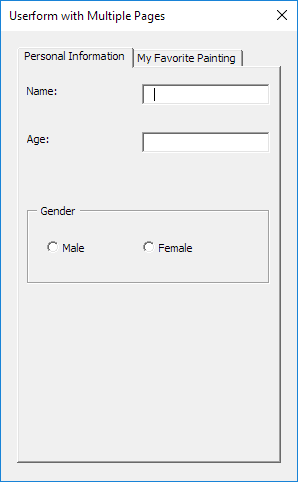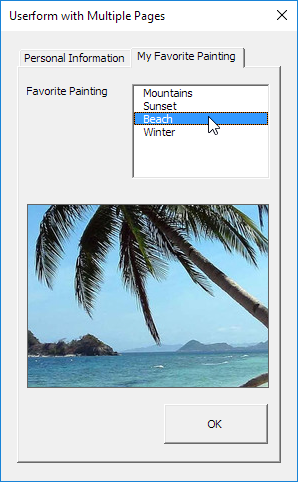Userform with Multiple Pages
Below we will look at a program in Excel VBA which creates a Userform that contains multiple pages. This userform also contains images.
The Multipage Control contains two pages. At page 1, the user can fill in his/her personal information. At page 2, the user can indicate which painting he/she likes the most.


To create this Userform, execute the following steps.
1. Open the Visual Basic Editor. If the Project Explorer is not visible, click View, Project Explorer.
2. Click Insert, Userform. If the Toolbox does not appear automatically, click View, Toolbox. Your screen should be set up as below.

3. Add the Multipage control, labels, text boxes (first at the top, the second below the first), frame, option buttons (first at the left, the second at the right), list box, Image control and command button. Once this has been completed, the result should be consistent with the empty version of the Userform shown earlier. For example, create a Multipage control by clicking on Multipage from the Toolbox. Next, you can drag a Multipage control on the Userform. When you arrive at the Gender frame, remember to draw this frame first before you place the two option buttons in it.
4. You can change the names and the captions of the controls. Names are used in the Excel VBA code. Captions are those that appear on your screen. It is good practice to change the names of the controls, but it is not necessary here because we only have a few controls in this example. To change the caption of the Userform, Multipage tabs, labels, frame, option buttons and command button, click View, Properties Window and click on each control.
5. To show the Userform, place a command button on your worksheet and add the following code line:
Private Sub CommandButton1_Click()
UserForm1.Show
End Sub
We are now going to create the Sub UserForm_Initialize. When you use the Show method for the Userform, this sub will automatically be executed.
6. Open the Visual Basic Editor.
7. In the Project Explorer, right click on UserForm1 and then click View Code.
8. Choose Userform from the left drop-down list. Choose Initialize from the right drop-down list.
9. Add the following code lines:
Private Sub UserForm_Initialize()
With ListBox1
.AddItem “Mountains”
.AddItem “Sunset”
.AddItem “Beach”
.AddItem “Winter”
End With
End Sub
Explanation: the list box on page 2 will be filled.
We have now created the first part of the Userform. Although it looks neat already, nothing will happen yet when we select an item from the list box or when we click on the OK button.
10. Download the images (right side of this page) and add them to “C:test”
11. In the Project Explorer, double click on UserForm1.
12. Double click on the list box.
13. Add the following code lines:
Private Sub ListBox1_Click()
If ListBox1.ListIndex = 0 Then
Image1.Picture = LoadPicture(“C:testMountains.jpg”)
End If
If ListBox1.ListIndex = 1 Then
Image1.Picture = LoadPicture(“C:testSunset.jpg”)
End If
If ListBox1.ListIndex = 2 Then
Image1.Picture = LoadPicture(“C:testBeach.jpg”)
End If
If ListBox1.ListIndex = 3 Then
Image1.Picture = LoadPicture(“C:testWinter.jpg”)
End If
End Sub
Explanation: these code lines load a picture depending on the selected item in the list box.
14. Double click on the OK button.
15. Add the following code lines:
Private Sub CommandButton1_Click()
Dim emptyRow As Long
‘Make Sheet1 active
Sheet1.Activate
‘Determine emptyRow
emptyRow = WorksheetFunction.CountA(Range(“A:A”)) + 1
‘Transfer information
Cells(emptyRow, 1).Value = TextBox1.Value
Cells(emptyRow, 2).Value = TextBox2.Value
If OptionButton1.Value = True Then
Cells(emptyRow, 3).Value = “Male”
Else
Cells(emptyRow, 3).Value = “Female”
End If
Cells(emptyRow, 4).Value = ListBox1.Value
‘Close Userform
Unload Me
End Sub
Explanation: first, we activate Sheet1. Next, we determine emptyRow. The variable emptyRow is the first empty row and increases every time a record is added. Next, we transfer the information from the Userform to the specific columns of emptyRow. Finally, we close the Userform.
16. Exit the Visual Basic Editor, enter the labels shown below into row 1 and test the Userform.
Result:

Next Chapter: Range




